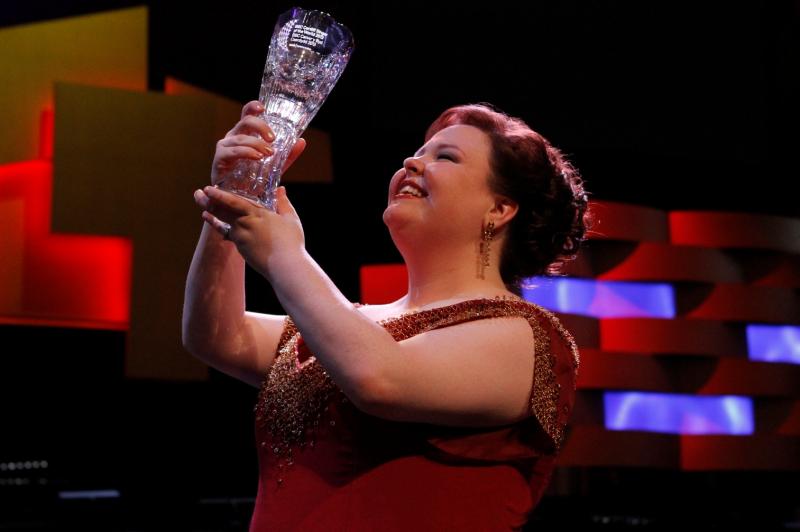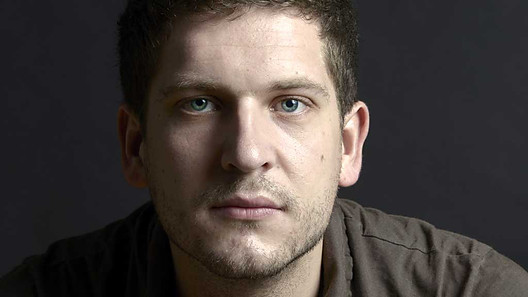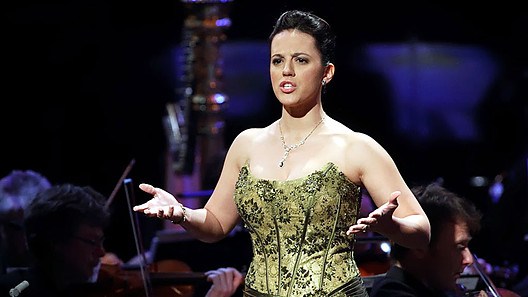BBC Cardiff Singer of the World Competition 2013 Final, BBC Four | reviews, news & interviews
BBC Cardiff Singer of the World Competition 2013 Final, BBC Four
BBC Cardiff Singer of the World Competition 2013 Final, BBC Four
Opulent mezzo Jamie Barton is the clear winner in a classy line-up

Once in a blue moon, the judges would seem to have got it wrong. I can think only of 2001, when stunning Latvian mezzo Elina Garanča failed to win the coveted goblet but has since gone on to deserved fame as one of the top half-dozen singers on the international stage today.
How so, given that all five finalists – not to mention the winner of the Dame Joan Sutherland Audience Prize, tried and tested English tenor Ben Johnson – would grace any opera house in the world with at least one of the characters whose arias they adopted? As declared several times in the course of the evening, it’s about the total package: personality, technique, communication, conjuring the world of each given opera in a couple of minutes. And, for that matter, choosing for the final a sequence of strong contrasts, though the judging is made over the course of a week which those of us Britten-tied, amongst other things, had reluctantly foregone.
Small mistakes shouldn’t matter, but Barton was the only singer not to put a foot, or a note, wrong last night. The minute she opened her mouth as the fiery, melodramatic Principessa di Bouillon, love rival of Cilea’s Adriana Lecouvreur, you could feel not only the throb but also the quality of the velvet mezzo voice. Dio mio, thought I, a singer who could step into the shoes of Met regular Stephanie Blythe or mezzo-cum-soprano Violeta Urmana at a moment’s notice.
 Cilea’s gran scena gave Barton the chance to run the Italianate gamut from jealousy to rapture; Humperdinck’s Witch encouraged the twinkle and a fair bit of lip-smacking at her own plump expense; Sibelius’s opportunity for expansiveness in that wonderful song "Was that a dream?" allowed her to lay down a rich Nordic carpet of sound; and nothing was to go deeper all evening than the bittersweet farewell of Berlioz’s Dido. What was commenter and first competition wonder-winner Karita Mattila going on about, missing colours in the voice and complaining about shallowness of expression? It wasn’t the last time in the evening that the Finn raised my fellow spectators’ eyebrows at home with some odd dismissals of the feminine talent on show.
Cilea’s gran scena gave Barton the chance to run the Italianate gamut from jealousy to rapture; Humperdinck’s Witch encouraged the twinkle and a fair bit of lip-smacking at her own plump expense; Sibelius’s opportunity for expansiveness in that wonderful song "Was that a dream?" allowed her to lay down a rich Nordic carpet of sound; and nothing was to go deeper all evening than the bittersweet farewell of Berlioz’s Dido. What was commenter and first competition wonder-winner Karita Mattila going on about, missing colours in the voice and complaining about shallowness of expression? It wasn’t the last time in the evening that the Finn raised my fellow spectators’ eyebrows at home with some odd dismissals of the feminine talent on show.
She went wild, though, for the only male finalist, Croatian bass-baritone Marko Mimica (pictured above) as Verdi’s Attila, all man and, agreed, quite a sound. But no-one was allowed a critical word of his lumpen Figaro Act Four aria – not a number to choose out of context, or if you haven’t been working on the Italian, say, over six weeks at Glyndebourne. He should have inserted a German number into the Italian sequence, too. Soprano Teresa Romano had the Callas manner but slightly generalized Latin passion, and Mary King was right to point out that you don’t tackle Leonora’s "Pace, mio dio" from La forza del destino if you don’t yet have the technique to float a pianissimo top B flat. Yet lirico spinto sopranos are not in such plentiful supply that Romano would be turned away at the Royal Opera, where I’ve seen lesser would-be divas on stage.
 I'd have been perfectly happy to see either of the other two win. Argentinian Daniela Mack (pictured left) was a mezzo of quite another sort to Barton, who won't be tackling Mack's Rossini heroines or Mozart trouser roles. A more natural actress than Romano, and looking gorgeous with her big, expressive brown eyes – glamour does matter in these events – Mack contrasted the suicidal determination of Massenet’s Sapho, the palpitating bewilderment of Mozart’s Idamante at his father’s rejection and the can-I-believe-it happiness of Rossini’s Cenerentola. All were sung with perfect intensity, but I’d have liked the option of a whitened tone once or twice and not all the coloratura runs in Cinders’ "Non piu mesta" were flawless, though she made interesting decorative choices. I look forward to seeing her on stage, though, as Strauss’s Octavian or Composer.
I'd have been perfectly happy to see either of the other two win. Argentinian Daniela Mack (pictured left) was a mezzo of quite another sort to Barton, who won't be tackling Mack's Rossini heroines or Mozart trouser roles. A more natural actress than Romano, and looking gorgeous with her big, expressive brown eyes – glamour does matter in these events – Mack contrasted the suicidal determination of Massenet’s Sapho, the palpitating bewilderment of Mozart’s Idamante at his father’s rejection and the can-I-believe-it happiness of Rossini’s Cenerentola. All were sung with perfect intensity, but I’d have liked the option of a whitened tone once or twice and not all the coloratura runs in Cinders’ "Non piu mesta" were flawless, though she made interesting decorative choices. I look forward to seeing her on stage, though, as Strauss’s Octavian or Composer.
Similarly, elfish looking Ukrainian soprano Olena Tokar (pictured below) will travel the world giving her ideally strange Rusalka, as a seamless Hymn to the Moon demonstrated. What was Mattila on about, claiming to know better Czech than her Slavic junior? And was Tokar’s Musetta really too lightweight, as Mattila claimed ? I heard a total change of tone colour as she moved from Pamina’s "Ach ich fühl’s" – again, one top-note snag, slighter than Romano’s - to the Puccini, where musicianship and dramatic instinct seemed flawless.
 Tokar and Barton were especially lucky with the likeable responsiveness of Jun Mӓrkl, one of the BBC National Orchestra of Wales’s two conductors; the other, Graham Jenkins, seemed less interested in rapport. Of the talking heads, King managed to say the most of significance in the shortest amount of time. Petroc Trelawny’s presentation was professional and low key, letting the women do most of the talking without imposing his own views. And while Glyndebourne chatelaine and hyper-communicative soprano Danielle de Niese didn’t get to ask backstage questions any more penetrating than those of the demoted Josie d’Arby - usually “how do you feel?” and “what would it be like to win?”, which elicited equally bland replies from the contestants - at least she knows her stuff.
Tokar and Barton were especially lucky with the likeable responsiveness of Jun Mӓrkl, one of the BBC National Orchestra of Wales’s two conductors; the other, Graham Jenkins, seemed less interested in rapport. Of the talking heads, King managed to say the most of significance in the shortest amount of time. Petroc Trelawny’s presentation was professional and low key, letting the women do most of the talking without imposing his own views. And while Glyndebourne chatelaine and hyper-communicative soprano Danielle de Niese didn’t get to ask backstage questions any more penetrating than those of the demoted Josie d’Arby - usually “how do you feel?” and “what would it be like to win?”, which elicited equally bland replies from the contestants - at least she knows her stuff.
You certainly believed her and Petroc about what a good time everyone had been having and how supportive the Cardiff audience was. As for Mattila, more snarky than seemed healthy for balance in her criticisms, well, you can’t win them all. The last image, of Barton holding her enraptured poise as all assembled sang “Hen Wlad Fy Nhadau” – that’s “Land of Our Fathers” to non Welsh speakers - was as emotive as any of the many high spots in a very classy evening’s entertainment.
- Available to watch on the BBC iPlayer for the next six days
- Reflections on the 2009 winner, soprano Yekaterina Shcherbachenko, on David Nice's blog
rating
Share this article
Add comment
The future of Arts Journalism
You can stop theartsdesk.com closing!
We urgently need financing to survive. Our fundraising drive has thus far raised £49,000 but we need to reach £100,000 or we will be forced to close. Please contribute here: https://gofund.me/c3f6033d
And if you can forward this information to anyone who might assist, we’d be grateful.

Subscribe to theartsdesk.com
Thank you for continuing to read our work on theartsdesk.com. For unlimited access to every article in its entirety, including our archive of more than 15,000 pieces, we're asking for £5 per month or £40 per year. We feel it's a very good deal, and hope you do too.
To take a subscription now simply click here.
And if you're looking for that extra gift for a friend or family member, why not treat them to a theartsdesk.com gift subscription?

Comments
I'm glad someone has
How funny that you are all
David is a very experienced
Actually, though I think the
Very good points there, Greg.
Very good points there, Greg. Having caught up with snippets of the Song Prize contestants, I agree totally that the prize should have gone to Ben Johnson (such an intelligent programme, too). And you're not the first to make the point that so many of the contestants now already have a career (especially Jamie Barton, and so did Shcherbachenko four years ago). It's worth remembering that Mimica is very young for a bass baritone and that fabulous instrument can only get richer. I do think the Mozart totally ruled him out, though.
Well I would not have given
Sign of musical jungle today
Do you mean winners of main
Do you mean winners of main or song prizes, Ismene? Most readily to mind are Harteros, Mattila, Cabell, Hvorostovsky, Terfel, Shcherbachenko,. Gasteen (while it lasted), Elizabeth Watts, Christopher Maltman. Not a bad track record.
As for Barton's bit parts, Meistersinger Magdalena in Chicago, Second Norn and more importantly - already planned, I guess - Rheingold Fricka in Houston and Adalgisa at the Met show a career already taking off.
Did you find Mack dull? I thought if anything she was over-vibrant, just needed to settle to a proper line or two.
Having watched the song final in its entirety, I can see why Barton swept the board with her magnificently voiced and characterised narratives. Johnson was more the tasteful Lieder singer, but there weren't comparable nodal points and I even began to question whether he's a true tenor rather than a baritone.
I thought Mack
Remember when Nina Stemme
I don't remember, Christina,
I don't remember, Christina, to my shame. Mind you, if that was around the time Stemme sang Manon Lescaut for English National Opera, I wouldn't have picked out the rather unsupported and undercoloured voice as a potential winner, let alone a future Isolde or Brunnhilde.